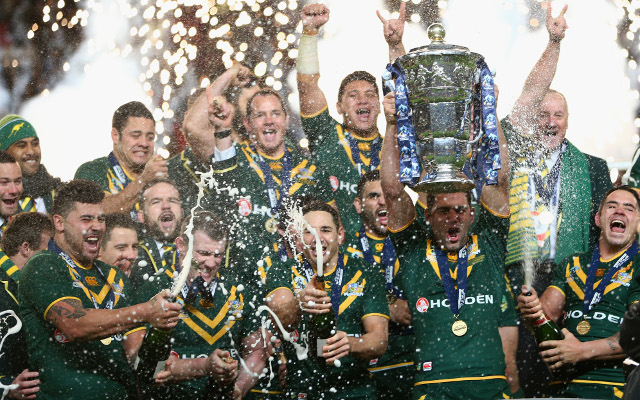Cameron Smith says the latest tournament was the best he has been a part of.
Rugby league is in rude health and continues to grow, according to World Cup-winning Australian skipper Cameron Smith.
The Kangaroos cruised to a crushing 34-2 victory over New Zealand in Saturday’s final, the 28th game in a 35-day tournament that was hailed as the best rugby league has ever had.
“I’ve luckily been involved in two World Cups and several Four Nations tournaments and every tournament has been a huge success,” said Smith.
“Every nation that’s been involved in this World Cup have done their job to grow the game, particularly in the northern hemisphere.
“We played the USA in a quarter-final – that’s only got to do good things for rugby league in the US. I think the international game’s in pretty good shape.
“We’ve seen the performances from those growing nations over the past five weeks getting better every year so hopefully we can continue playing these tournaments and keep growing the game around the world.”
Detractors will point to Australia’s record of only conceding four points (from two penalties) in their final five matches in the World Cup.
Crushing victories over Ireland (50-0), the USA (62-0) and Fiji (64-0) in between initial pool victories over England (28-20) and Fiji (34-2) and the final against the Kiwis left many questioning the gulf in competition.
But the defenders of rugby league, in which Australia, New Zealand and England are the stand-out trio, argue that similar scores are racked up in rugby union, and only four nations have won the union World Cup compared to league’s three – the same three countries plus South Africa.
League, it is argued, is also a lot less forgiving once a team has its head up given that very little time is spent at collapsing scrums or organising line-outs – often seen as an occasion to slow a dominant side down in union.
This league World Cup has certainly not backed down from bidding to fill some of Britain’s most iconic stadiums – the Millennium in Cardiff, Wembley and Old Trafford, as well as seeing the USA play the Cook Islands in Bristol’s Memorial Ground in front of almost 8,000 fans.
Some 45,000 attended the opening double-header in the Welsh capital, almost 68,000 packed into Wembley and Old Trafford was a sell-out, a league world-record crowd of 74,468 fans making it the best attended match ever.
Two games in France, in Avignon and Perpignan, were total successes, the French team featuring twice in front of sell-outs in a massive boost for a country where league was infamously banned by the World War II Vichy government.
Organisers estimate that more than 450,000 spectators have watched the tournament, with BBC television figures peaking at 2.83 million for the semi-final between England and New Zealand.
“I think it’s been wonderful, I really do,” said Kiwi coach Stephen Kearney. “It’s been a real credit to the English game and the way they’ve organised it and the type of football that’s been played and the crowds that have turned up.”
The last time England hosted the World Cup was in 2000 and it was generally considered a disaster, with organisers, not helped by terrible weather and poor transport, badly over-reaching in terms of venues and suffering shocking crowd figures as a result.
It has been different this time around, England Rugby Football League (RFL) chairman Brian Barwick dubbing it “an absolutely tremendous tournament”.
“It’s great to have seen sell-out signs everywhere, in places like Cumbria and even in France, to name but a few.
“There have been some excellent contests and I think there’s been a real positivity about the tournament, from the opening ceremony in Cardiff to the final here at Old Trafford.”
Barwick, a former chief executive of England’s Football Association (FA), added: “It’s engaged a wider level of press interest than the game normally received and it’s been a positive press.
“We may have found new general sports fans too and hope we’ve tickled the chin of broadcasters, potential commercial partners and sponsors as there has been comprehensive coverage of the tournament throughout.”
The biggest name in league is undoubtedly Sonny Bill Williams, the Kiwi second-rower who won a union World Cup winners medal with the All Blacks in 2011 and is also the country’s heavyweight boxing champion.
“I guess this is not as big,” he said at one of New Zealand’s pool games this time around.
“I remember after the first game (of the 2011 World Cup), I went into a media room and there would have been over a hundred cameras and journalists. It was pretty crazy.
“Obviously rugby (union) is probably a much bigger sport globally.”
The fact Williams, a truly global sporting figure, went back on an initial decision not to take part in the league World Cup can but show that, while not a rival to union, league has its place and needs more investment to secure its growth to provide stiffer opposition to the top three.

COMMENTS